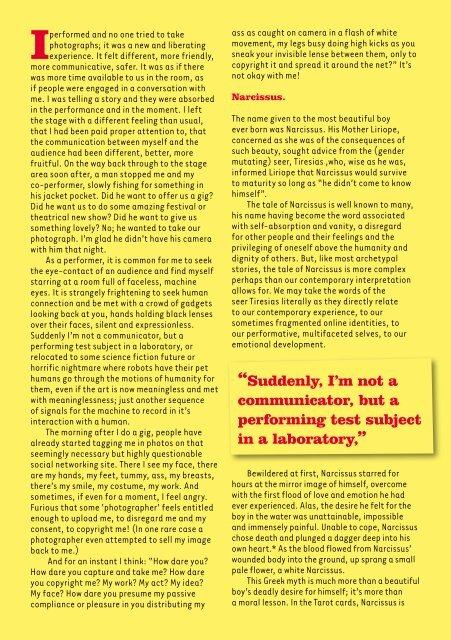You also want an ePaper? Increase the reach of your titles
YUMPU automatically turns print PDFs into web optimized ePapers that Google loves.
I<br />
performed and no one tried to take<br />
photographs; it was a new and liberating<br />
experience. It felt different, more friendly,<br />
more communicative, safer. It was as if there<br />
was more time available to us in the room, as<br />
if people were engaged in a conversation with<br />
me. I was telling a story and they were absorbed<br />
in the performance and in the moment. I left<br />
the stage with a different feeling than usual,<br />
that I had been paid proper attention to, that<br />
the communication between myself and the<br />
audience had been different, better, more<br />
fruitful. On the way back through to the stage<br />
area soon after, a man stopped me and my<br />
co-performer, slowly fishing for something in<br />
his jacket pocket. Did he want to offer us a gig?<br />
Did he want us to do some amazing festival or<br />
theatrical new show? Did he want to give us<br />
something lovely? No; he wanted to take our<br />
photograph. I’m glad he didn’t have his camera<br />
with him that night.<br />
As a performer, it is common for me to seek<br />
the eye-contact of an audience and find myself<br />
starring at a room full of faceless, machine<br />
eyes. It is strangely frightening to seek human<br />
connection and be met with a crowd of gadgets<br />
looking back at you, hands holding black lenses<br />
over their faces, silent and expressionless.<br />
Suddenly I’m not a communicator, but a<br />
performing test subject in a laboratory, or<br />
relocated to some science fiction future or<br />
horrific nightmare where robots have their pet<br />
humans go through the motions of humanity for<br />
them, even if the art is now meaningless and met<br />
with meaninglessness; just another sequence<br />
of signals for the machine to record in it’s<br />
interaction with a human.<br />
The morning after I do a gig, people have<br />
already started tagging me in photos on that<br />
seemingly necessary but highly questionable<br />
social networking site. There I see my face, there<br />
are my hands, my feet, tummy, ass, my breasts,<br />
there’s my smile, my costume, my work. And<br />
sometimes, if even for a moment, I feel angry.<br />
Furious that some ‘photographer’ feels entitled<br />
enough to upload me, to disregard me and my<br />
consent, to copyright me! (In one rare case a<br />
photographer even attempted to sell my image<br />
back to me.)<br />
And for an instant I think: “How dare you?<br />
How dare you capture and take me? How dare<br />
you copyright me? My work? My act? My idea?<br />
My face? How dare you presume my passive<br />
compliance or pleasure in you distributing my<br />
ass as caught on camera in a flash of white<br />
movement, my legs busy doing high kicks as you<br />
sneak your invisible lense between them, only to<br />
copyright it and spread it around the net?” It’s<br />
not okay with me!<br />
Narcissus.<br />
The name given to the most beautiful boy<br />
ever born was Narcissus. His Mother Liriope,<br />
concerned as she was of the consequences of<br />
such beauty, sought advice from the (gender<br />
mutating) seer, Tiresias ,who, wise as he was,<br />
informed Liriope that Narcissus would survive<br />
to maturity so long as “he didn’t come to know<br />
himself”.<br />
The tale of Narcissus is well known to many,<br />
his name having become the word associated<br />
with self-absorption and vanity, a disregard<br />
for other people and their feelings and the<br />
privileging of oneself above the humanity and<br />
dignity of others. But, like most archetypal<br />
stories, the tale of Narcissus is more complex<br />
perhaps than our contemporary interpretation<br />
allows for. We may take the words of the<br />
seer Tiresias literally as they directly relate<br />
to our contemporary experience, to our<br />
sometimes fragmented online identities, to<br />
our performative, multifaceted selves, to our<br />
emotional development.<br />
“Suddenly, I’m not a<br />
communicator, but a<br />
performing test subject<br />
in a laboratory,”<br />
Bewildered at first, Narcissus starred for<br />
hours at the mirror image of himself, overcome<br />
with the first flood of love and emotion he had<br />
ever experienced. Alas, the desire he felt for the<br />
boy in the water was unattainable, impossible<br />
and immensely painful. Unable to cope, Narcissus<br />
chose death and plunged a dagger deep into his<br />
own heart.* As the blood flowed from Narcissus’<br />
wounded body into the ground, up sprang a small<br />
pale flower, a white Narcissus.<br />
This Greek myth is much more than a beautiful<br />
boy’s deadly desire for himself; it’s more than<br />
a moral lesson. In the Tarot cards, Narcissus is<br />
Above: ‘Narcissus’ by Emily Aoibheann



